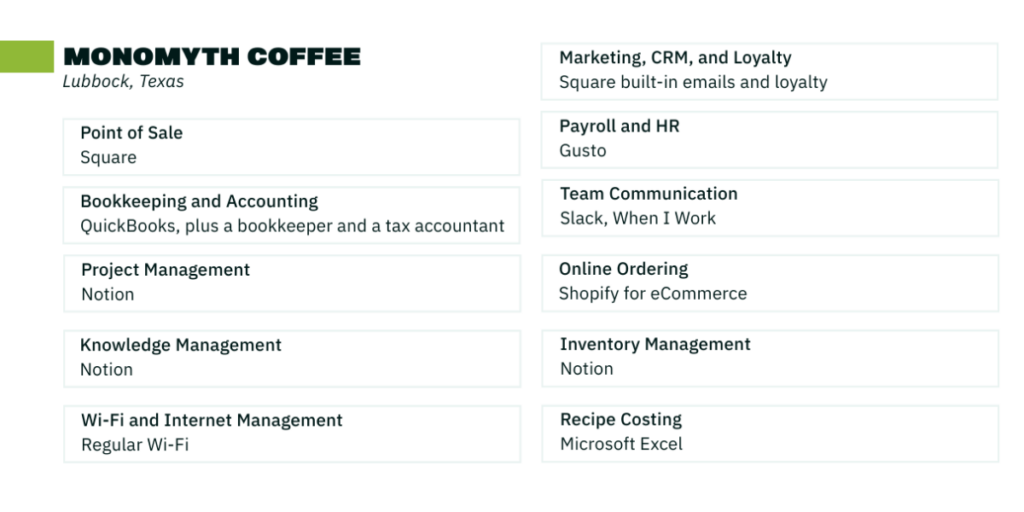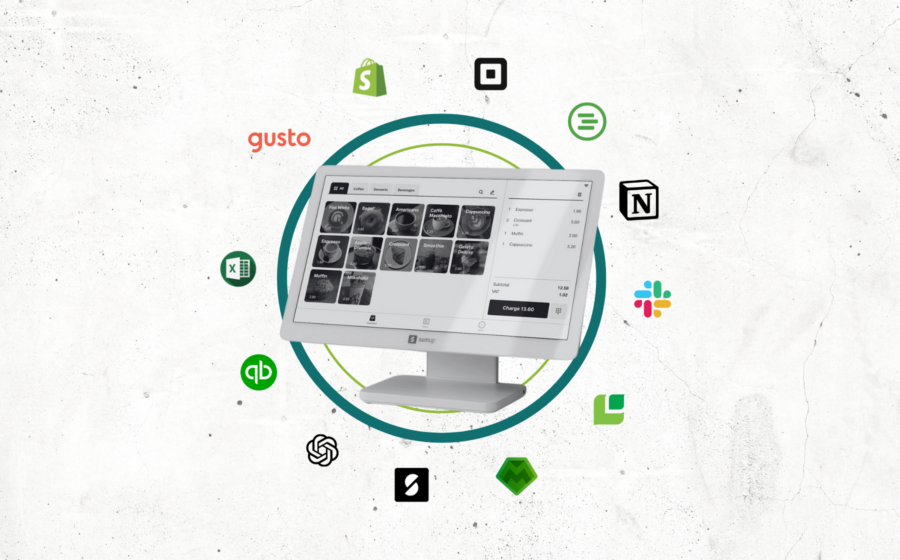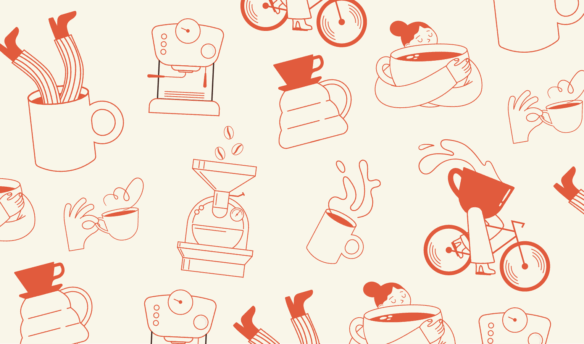This story appears in The Coffee Shop Handbook, Fresh Cup’s print resource for coffee shop leaders—get your copy here.
The days of opening a coffee shop with just an analog cash register and “buy 10, get one free” punch cards are long gone. The contemporary coffee shop’s needs are far more complex, more digital, and more connected than ever before—and building a robust technology stack that meets those needs is essential for today’s coffee founders.
Thankfully, there are a wealth of programs and products available to help you master your operations. From point of sales systems and digital loyalty platforms to team communication and knowledge management apps, there’s no shortage of tools available to help you build and support your dream. But assembling the right set of tech that works for your situation? That’s the challenge.
To help you get started, we interviewed four coffee shop owners about how they’ve constructed their tech stacks to meet the needs of their growing businesses.

Brewpoint Coffee
Melissa Villanueva, CEO
Elmhurst, Illinois
Three Locations

White Rhino
Blaine Duhe, Executive Director
Cedar Hill, Texas
15 Locations

Populace Coffee
Andrew Heppner, CEO
Bay City, Michigan
One Location
Day-One Tech Essentials
There are some tools that are nice to have—then there are others you cannot live without. For Blaine Duhe, executive director at White Rhino Coffee, “The most important thing is having a well-functioning point of sale (POS) system with a timeclock function that integrates seamlessly into an adequate payroll system. Not having that setup will ruin your working life.”
Duhe’s warning touches on a critical component of the modern tech stack: Individual tools and systems work best when they are integrated, not when they are siloed off from each other. Integrated tools can share data and automate tasks.
For example, a POS with time-clocking and payroll connections can combine sales and labor-cost data to give you visibility into your busiest times of day, and whether you are staffing properly for those periods. While you can always pull up individual reports on different tools and look for insights, the time it takes to cross-reference 10 different tasks and tools adds up. Most coffee founders we know don’t want to be stuck managing reports all day.
The most important thing is having a well-functioning point of sale (POS) system with a timeclock function that integrates seamlessly into an adequate payroll system. Not having that setup will ruin your working life. Blaine Duhe, WHITE RHINO COFFEE
Using the POS as the centerpiece of a coffee shop’s tech stack is a strategy shared by Randall Jackson, owner of Monomyth Coffee. “Square has been the go-to POS for us mostly because of the ease of use. The POS is easy to set up, take payments, and train on. The built-in analytics, bank connections, [and] QuickBooks connection on the back end make it simple for things to show up in the right places.”
Another critical tech stack component that all four coffee shop owners brought up is bookkeeping software. Don’t try to brute force it with a spreadsheet, they caution—instead, block off time to keep up with your books, and learn the software you end up using.
Andrew Heppner, co-owner of Populace Coffee, swears by QuickBooks in particular. “QuickBooks has helped me understand how my business operates better than any other app. It helps me make budgets and give real-time info that I can make choices off of.” As he advises, “Invest in your knowledge on how to make QuickBooks work for you and maintain it well. It’s easy to let it get out of hand if you are not vigilant.”

Building Your Tech Stack for Growth
As you get your business feet under you, it’ll become helpful to explore more specialized tools.
Our interviewees highlighted several other areas where technology can make a significant impact as your business grows.
Marketing and Customer Loyalty
For most coffee shop owners, the marketing tools built into their POS systems will be enough to get started. But as you grow and potentially add locations, it’ll be worth building out a more feature-rich loyalty program.
White Rhino Coffee uses Incentivio for loyalty and online ordering. “Incentivio powers our in-house online-ordering platform,” Duhe says. “We are also on DoorDash and UberEats for third-party delivery, and ezCater for online catering orders.” Other marketing platforms include AudienceTap for text ordering, Mailchimp for email marketing, and the Joe Coffee app for loyalty.
Team Communication
Dedicated communication tools are essential for organizing conversations and fostering collaboration as teams grow. Monomyth Coffee uses Slack for team communication. The app is “easy to use, and keeps conversation accessible in a place other than text messages,” Jackson explains.
Some coffee shops graduate to several different platforms, depending on the size of their teams. White Rhino, for example, has two systems for team communication: one for the HQ team, and another for employees within individual cafe locations. “Our above-store team uses Teams for messaging while our shops use the messenger built into Sling scheduling software,” Duhe says.
Knowledge and Project Management
You will have marketing ideas. You will have meeting notes. You will have company recipes. You will have document templates. You will have complex projects broken up into smaller tasks. And you will need a place to store and interact with all of that information.
“[Notion] has become our central hub for everything from project management to standard operating procedures,” Villanueva says. “It’s a place to organize my often-cluttered thoughts and ideas—it’s like creating my own digital feng shui.”
When we had multiple locations and different pay rates and roles, it was critical that we could see labor, scheduling, and communication tools all in one place. Andrew Heppner, POPULACE COFFEE
Jackson echoes the praise for Notion. “Garrett Oden [yours truly] actually got us hooked on the platform and now we use it for everything. We built a Trello-like project board that we can update goals in a weekly or monthly update. We also use [a Notion database] for our wholesale and catering CRM [customer relationship management].”

Inventory Management
Effective inventory management prevents waste and over-ordering, which helps keep the cost of goods under control. Jackson uses Notion for this purpose. “Notion is the GOAT here because we build in inventory lists that automatically populate into an order list, and make it simple for our team to have long-term inventory and weekly inventory written in one place,” he explains. Other possible tools include MarketMan, Google Sheets, and add-on modules by POS providers.
Scheduling
Scheduling software manages shift assignments and creates a single accessible platform for team schedules, so nobody gets confused. Populace Coffee utilizes Homebase for scheduling. “When we had multiple locations and different pay rates and roles, it was critical that we could see labor, scheduling, and communication tools all in one place,” Heppner says.
Recipe Costing
Costing your recipes is crucial for maintaining profit margins and pricing products effectively. There are specialized tools to help with this, like MarketMan or EZchef, though even getting started in a spreadsheet is better than nothing. “These sheets are something we built out in Excel when we started, and it has just been more convenient than moving it somewhere else,” Jackson says.
Payroll and HR
Payroll tools help streamline payroll processing, manage employee information, and ensure compliance with labor laws. White Rhino uses BambooHR, Monomyth Coffee opts for Gusto, and Populace uses an independent payroll service.

How To Pick the Right Tools
Building your tech stack isn’t something you do once. Your business and operations will evolve over time, and so will the tools you need to continue running smoothly. Our interviewees had a few general pointers to share about picking the right tools.
Prioritize Flexibility
Heppner advises against making big technology commitments early on, and instead prioritizing flexibility. “Do not lock into any long-term options, because you are going to learn a lot about your needs once you’re open and operating,” he says. “This isn’t something you can guess at.”
In a similar vein, Jackson suggests not trying to do everything out of the gate, and instead starting small. “Find out if there is a free version of an app or an alternative app with similar functionality in order to keep your expenses low in the beginning. As you build your business, you can look into the paid versions in order to reclaim your time.”
Test New Tools Deeply
To stay focused, Villanueva recommends hands-on testing. “Be patient, be willing to experiment, and always keep your specific needs and goals in mind. I’d dedicate either a full day or a couple of hours over a few weeks to each platform, really putting it through its paces with my team.”
Be patient, be willing to experiment, and always keep your specific needs and goals in mind. I’d dedicate either a full day or a couple of hours over a few weeks to each platform, really putting it through its paces with my team. Melissa Villanueva, BREWPOINT COFFEE
That slow-rolling approach has been effective, Villanueva adds, and has led to longer-term efficiency. “It took about 40 hours spread over six months, but we’ve finally found a tech stack that not only works but actively improves my leadership and saves me at least five hours a week.”
When it’s time to make decisions about big tech platforms, like your POS system or loyalty platform, Duhe advises caution. “In my experience, almost all softwares don’t do 100% of the things they say they do,” he says. “Ask for working demos or test portals that you can click around in to see exactly how the tech works.”

Justify Every Tech Investment
Duhe stresses that you should know exactly what you need—and what you can pay for—before signing on any dotted lines. “Be aware of the exact functionality you want and stick to that plan and budget!” he says. “Be realistic about what you can afford. Set a percentage target vs. your projected sales to derive a dollar budget, and don’t take on so much software cost that it goes over your number. We all love the shiny new thing and for many of us, our first instinct is to go out and buy it. You have to put it into the context of your P&L [profit and loss statement] before you do anything.”
Remember, the goal isn’t to adopt every available tool, but to find the right combination that supports your unique business needs and growth trajectory. As your coffee shop evolves, it’s best to regularly reassess your tech stack to ensure it’s still serving you effectively.








